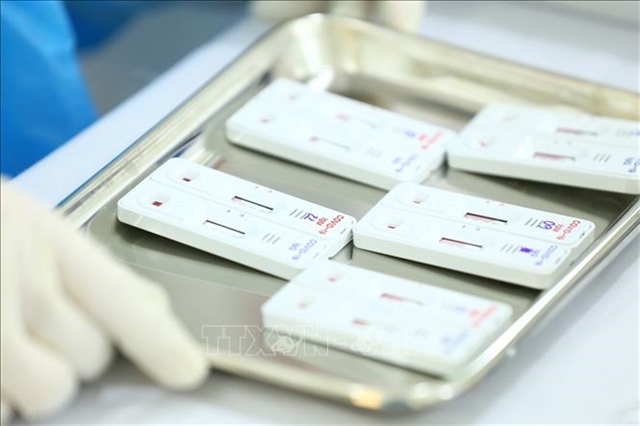 Society
Society

As the number of new COVID-19 infections in Hà Nội continues to rise after the Tết holidays, people have been rushing to buy COVID-19 rapid test kits, causing a shortage and increased prices in some areas.

|
| The Government have called for caution in stockpiling home rapid tests. The Tết holidays are said to be the main reason for the increased demand for rapid tests. — VNA/VNS Photo |
HÀ NỘI — As the number of new COVID-19 infections in Hà Nội continues to rise after the Tết (Lunar New Year) holidays, people have been rushing to buy COVID-19 rapid test kits, causing a shortage and increased prices in some areas.
The director of the Department of Medical Equipment and Construction under the Ministry of Health Nguyễn Minh Lợi said that the ministry was aware of the shortage and inconsistent pricing for rapid COVID tests.
He said that the complicated developments of the pandemic combined with the return to work and school after the Tết holidays are the main reason for the increased demand for rapid test kits.
The phenomenon of speculating, hoarding or taking advantage of the pandemic to increase the selling prices of medical equipment has been reported, he said.
To promptly tackle the issue, the Ministry of Health held an online meeting with manufacturers and importers of COVID test kits, he said.
Accordingly, health authorities called on COVID-19 rapid test kit producers and importers to increase production and import activities to ensure supply and product quality. Distributors and retailers are required to publicise prices and not stockpile or increase prices, which could result in scarcity in the market.
The Ministry of Health now has very specific guidelines for suspected infections (F1) and confirmed infections (F0). These regulations have been distributed.
It is recommended that people contact their nearest medical facility for detailed instructions, and avoid unnecessarily buying tests, limiting waste that could affect the environment.
If it is necessary to buy a kit, people are recommended to buy products with a clear origin, belonging to the list of products that have been granted circulation permits and import licences by the Ministry of Health. The products must be labelled with sufficient information as prescribed and have user manuals in Vietnamese.
The ministry urged users to carefully follow the instructions for using the products to avoid buying fake goods, goods of unknown origin, and poor quality goods.
Lợi said that the ministry asked the people's committees of the provinces and centrally-run cities to coordinate and take the initiative in production and business activities, to ensure proper supply and stabilise the medical equipment prices.
Functional agencies and market managers will strengthen inspection and examination of selling prices to detect any overcharging or hoarding.
Finally, to stabilise the price of COVID test kits on the market, the Ministry of Health will coordinate with price management agencies, market management, customs and other agencies to carry out inspection and examination of test prices, Lợi said.
Lợi affirmed that medical equipment and biological products for diagnosis and testing of COVID circulating on the market must have a registration number or an import permit in accordance with the provisions of Decree No 98/2021/NĐ-CP.
Business units must be eligible to buy and sell class C and D medical equipment according to the provisions of the decree.
The Health Ministry is working with the Ministry of Finance to propose that COVID test kits are added to a list of price stabilisation products, Lợi said.
According to the health ministry, as of February 23, 2022, the ministry licensed 169 medical devices, with 14 domestically produced and 155 imported products including 56 genetic material testing products, 83 SARS-CoV-2 antigen testing products and 30 anti-SARS-CoV-2 antibody testing products.
Since the fourth wave of the COVID-19 broke out in Việt Nam late April last year, Hà Nội has reported nearly 220,000 cases, behind HCM City with 523,593 cases and Bình Dương Province with 294,644 cases. — VNS




